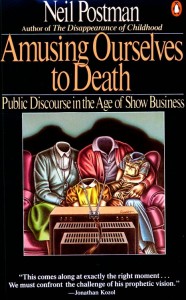 In one of his longest and most candid interviews, David Foster Wallace spoke of the difficulties of writing fiction for modern audiences weaned on television. It is not that we are stupider, Wallace argues, but that we have been trained to seek entertainment above all else. And when it comes to entertaining, no medium can revival television’s rapid pacing and ease of enjoyment. If literature is to survive in any meaningful sense, it has to position itself as offering something else entirely, something perhaps more valuable than cheap thrills or a quick laugh. In Amusing Ourselves To Death, cultural critic Neil Postman contends that television has fundamentally altered our relationship to ideas, rendering us no longer able to appreciate or even recognize the higher pleasures of the mind.
In one of his longest and most candid interviews, David Foster Wallace spoke of the difficulties of writing fiction for modern audiences weaned on television. It is not that we are stupider, Wallace argues, but that we have been trained to seek entertainment above all else. And when it comes to entertaining, no medium can revival television’s rapid pacing and ease of enjoyment. If literature is to survive in any meaningful sense, it has to position itself as offering something else entirely, something perhaps more valuable than cheap thrills or a quick laugh. In Amusing Ourselves To Death, cultural critic Neil Postman contends that television has fundamentally altered our relationship to ideas, rendering us no longer able to appreciate or even recognize the higher pleasures of the mind.
Where Marshall McLuhan insisted that the “medium is the message,” Postman contends instead that “the medium is the metaphor,” by which he means that the medium by which an idea is conveyed also delineates the idea itself. “A message denotes a specific, concrete statement about the world,” Postman writes. “But the forms of our media, including the symbols through which they permit conversation, do not make such statements. They are rather like metaphors, working by unobtrusive but powerful implication to enforce their special definitions of reality.” Reality is rendered differently in a half-hour sitcom than in a four-hundred page novel, just as no “social media” network of friends can hope to approximate –or, worse, replace – the real delights and difficulties of friendship. What happens to us when we give more and more of our time to these Platonic shadows?
Postman invokes Huxley’s Brave New World, a dystopian nightmare in which society is controlled not by force or fear but by pleasure. Books do not need to be burned in a society that doesn’t read. The government doesn’t have to lie to citizens too apathetic or distracted to care. “Where people once sought information to manage the real contexts of their lives, now they had to invent contexts in which otherwise useless information might be put to some use.” I read those words and shuddered, reminded of Alexis de Tocqueville’s famous imagining of how a free people might find itself enslaved:
I would like to imagine with what new traits despotism could be produced in the world. I see an innumerable crowd of like and equal men who revolve on themselves without repose, procuring the small and vulgar pleasures with which they fill their souls…
Above these an immense tutelary power is elevated, which alone takes charge of assuring their enjoyments and watching over their fate. It is absolute, detailed, regular, far-seeing, and mild. It would resemble paternal power if, like that, it had for its object to prepare men for manhood; but on the contrary, it seeks only to keep them fixed irrevocably in childhood; it likes citizens to enjoy themselves provided that they think only of enjoying themselves.
Today, these small and vulgar pleasures surround us, so much so that it’s difficult to escape them, but my how we enjoy ourselves.